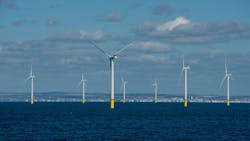Consent for Rampion wind farm expansion offshore southern England
Britain’s government has issued a development consent order for the Rampion 2 offshore wind farm in southern England, according to an April 4 RWE news release.
This will be an extension of the nearby Rampion wind farm offshore the Sussex coast. RWE is leading the development in partnership with a Macquarie-headed consortium and a subsidiary of Enbridge.
Assuming a positive financial investment decision, construction would be followed by first power by the end of this decade. The project is eligible for submission into a future Contract for Difference auction.
Rampion 2 will feature up to 90 offshore wind turbines and foundations, with subsea cables taking the generated electricity to the shore, under Climping Beach.
From there the connecting underground cable system will deliver the power to a new substation at Oakendene near Cowfold, and onward into the transmission network at Bolney, mid-Sussex, south of London.
Last month, Cadeler’s installation vessel Wind Peak installed the first turbine at RWE’s Sofia offshore wind farm development (1-4 GW) on Dogger Bank in the UK southern North Sea.
During each visit to the location, Wind Peak will transport six sets of Siemens Gamesa 14-MW SG 14-222 wind turbines.
Sofia should be fully operational in the second half of next year.
Hybrid power – the promise of offshore wind and solar
Offshore wind energy developers are looking to solar technologies to enhance the reliability of their renewable energy projects. The basic idea is that while solar power peaks during the day, offshore wind turbines generate power in the afternoon and evening. Employing both, it is argued, can lead to a more reliable and more balanced power production profile.
